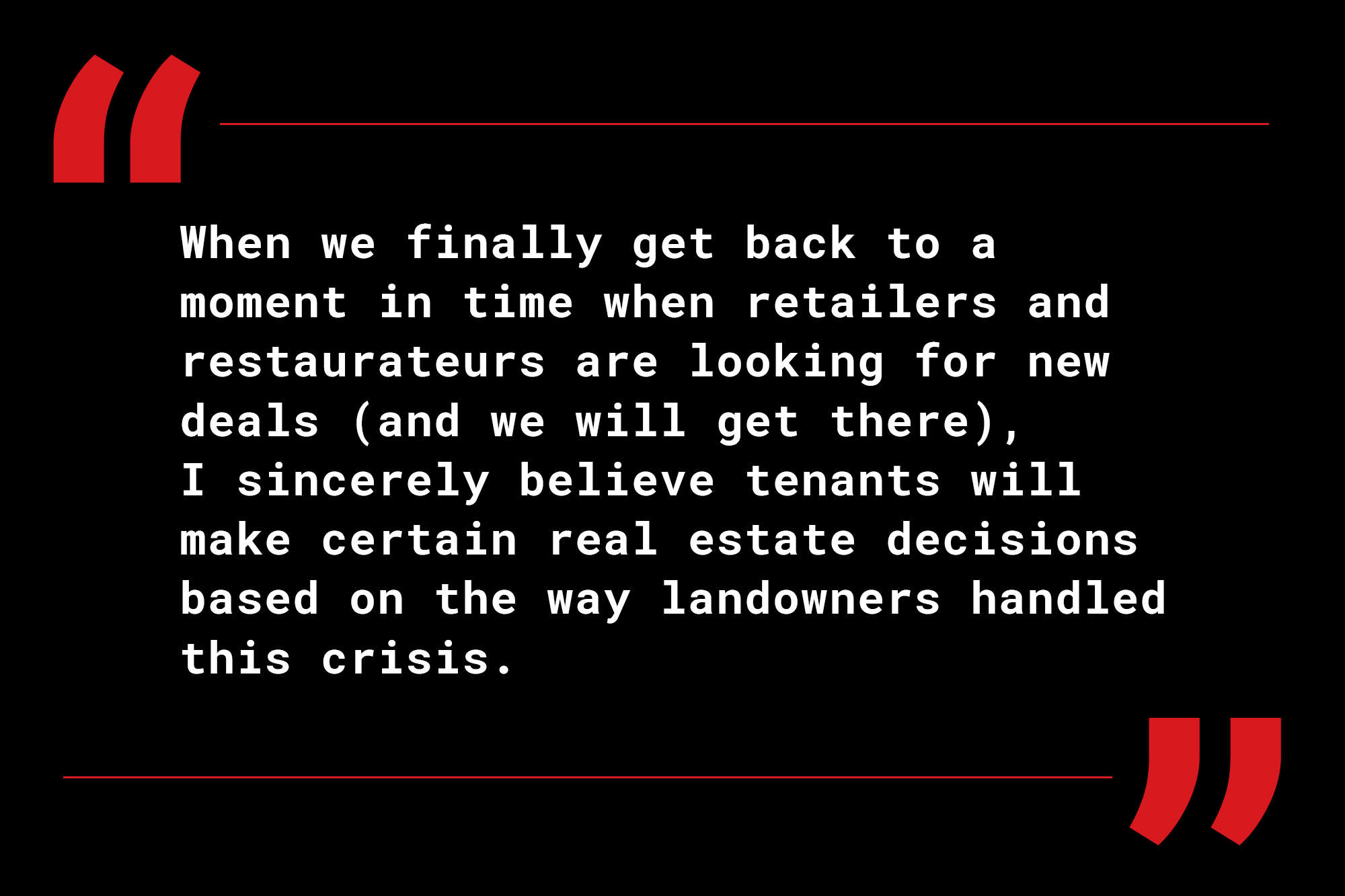Update #3: A Lot to Process
Dear Clients & Colleagues:
Earlier this month, just before our first email to this list on 3/13, I was of the opinion that Graffito’s core role in this COVID-19 madness in the near-term was simply being able to provide as much notice as possible to our clients re: the extreme hardship afoot for retailers. This has moved at lighting speed though, and starting the weekend of 3/14 we quickly shifted our focus from observers to advocates. We ramped up our direct engagement with and info gathering from retailers and restaurateurs; launched and populated an updated blog with resources and perspectives; and opened up lines of communication with like-minded elected officials, neighborhood orgs, and colleagues. This work has been meaningful but mind-numbing. It continues today, but not at the same rapid-fire pace as last week.
This week our work moved into a new phases: that of issues spotting and solution evaluation. We’ve spent more time this week talking to Landlords (locally and nationally), reading policy pieces from other professionals, and tracking the scale of economic damage to tenants, which is rapidly bleeding over from food, beverage and entertainment to other segments of our economy.
As we move into this new phase, it feels appropriate to hit pause for a moment and send a recap to you all. To do this I’ve organized this email into four sections and I stress that all of this (and our understand of it) is very much a work in progress. As such I welcome feedback, info sharing, and alternative perspectives.
I. Current Tenant Realities
II. Landlord Considerations
III. Emerging Legal Arguments
IV. Noteworthy Stuff Other Landlords Are Doing
***
I. Tenant Realities
The headlines here are mass closings, retail/restaurant layoffs, and pleas for LL and Government assistance (the later of which of course is the biggie). As the panic and intensity of last week subsides a bit for restaurants and retailers, there is now a second wave of questions and concerns that are surfacing, which we all need to be aware of. Retailers are asking their advisors, partners and confidants questions like:
- How long can I keep my core staff on payroll (assume for now that most, but not all, retailers have laid off non-management, hourly and PT workers)?
- How do I care for the staff that I laid off, getting them and their families basic necessities and food, supporting them in filing for unemployment, etc.? And even more nuanced, what about the non-citizen workers that were on my staff — how do we look after those that are most vulnerable and won’t get any government assistance?
- Why can’t I get a clear answer from my LL about April 1 rent? And, further, what are my legal grounds, if any, for withholding rent (more on this in Section III below)?
- Will my supply chain be up and running when I can finally reopen?
- Do I open all my locations back up after this mess or just my best performing units?
- When the Governor says it’s safe to reopen, will people come back right away and how do I staff up / ramp up quickly enough? Related: what happens if there is another wave of widespread COVID-19 infections and I have to close again — how can I possibly manage another shutdown?
This list of questions just scratches the surface of what’s facing retailers and restaurateurs. Their world is forever changed. But even so, almost all the retailers we have spoke to plan to reopen. This is reason for optimism. But it’s also reason for us all to rethink how deals get structured moving forward and to think realistically about the length of impact here, which is not a few months but many months for most retail tenants.
To illustrate the above point, think about a restaurant tenant. Let’s say May 4th the Governor announces schools and non-essential business can open in MA. This then starts the process for some of reopening, which will take weeks and maybe months. Staff needs to be rehired (and retrained). Inventory needs to be reordered and, first, distributors needs to get their feet back under them. Menus and hours will need to be rethought. And, mostly likely, occupancy counts and floors plans will require some tweaking given any “OK to open” will surely be accompanied by regulations that maintain some sort of distancing measures. So, in sum, reopening for retailers and restaurants is not nearly as simple or streamlined as the media and government is portraying it. It’s a process, and this process take times and money.
II. Landlord Realities & Considerations
As we’ve told dozens of tenants of late, the type of Landlord you have (institutional investor, REIT, family office, or just a family with a few retail properties) will make a material difference in your landlord-tenant dealings over the coming weeks and months. Landlord responses to this crisis have been all over the board so far. Despite the diversity of approaches we are seeing, I can say without hesitation that the best and smartest Landlord responses we have seen to date are from ownership groups that have proactively reached out to Tenants, are showing empathy, and are reaffirming their commitment to the LL/Tenant partnership. Communication right now is critical, even if it comes without hard-and-fast remedies. Alternatively, we have been privy to certain Landlords approaching tenant dealings in an adversarial vs. collaborative way. We think this is a mistake. In the long-term these landlords will lose tenants, engage in extended and expensive legal battles, and credibility with retailers will be lost.
Regardless of your approach, I stress the following: a few months of no rent is far better than a few years of no rent. And I also stress this for your consideration: the way you, the landlord, react in this moment of crisis will be remembered by tenants. When we finally get back to a moment in time when retailers and restaurateurs are looking for new deals (and we will get there), I sincerely believe tenants will make certain real estate decisions based on the way landowners handled this crisis. Tenants will increasingly consider “is this the sort of Landlord I want to do business with for the next 10 – 20 years…” And the same goes the other way. I have no doubt that part of the conversation we will have with many of you as we evaluate tenants in the future is “how did they (the prospective tenant at issue) handle the coronavirus crisis of 2020?” Those tenants that are communicating well in this moment, providing candid and honest information, and are acting in good faith in dealings with their various landlords are the sort of tenants we want to put in our projects moving forward.
III. Emerging Legal Arguments re: Lease Rights and Obligations
Our leases, ordinary transactional tools, and usual remedies aren’t enough right now. So buckle-in for some significant lawyer time over the next few months and be aware that Tenants and their attorneys are currently grasping at various (often dubious) legal theories in an attempt to secure rent relief. The smarter tenants aren’t operating through attorneys (yet), but unfortunately there are some that are already evaluating this crisis through the lens of litigation and adversarial measures.
The first place most attorneys went last week was force majeure, and we’ve seen a bunch of letters (mostly from national tenants) asserting that rent obligations for April 1 are subject to such. This isn’t a good argument in most circumstances, as most retail leases carve out economic covenants from force majeure. Conversely, certain non-economic covenants will surely be subject to force majeure during this time, particularly those related to minimum operating hours and go dark provisions. Force majeure is highly relevant for those retail deals that are post lease signing but before open for business. It’s projects currently in this build-out period that must be understood through the lens of force majeure. Leases need to be reviewed as related to things like permitting milestones, delivery date(s), construction timing and approvals, contingencies, and of course rent commencement dates that may have floating triggers.
There are a handful of other crafty legal arguments that tenant attorneys are working on. The three most noteworthy that I’ve heard about of late are:
- Arguments based on co-tenancy requirements that are being triggered with the current wave of retail closures. This is particularly relevant for landlords with shopping center and/or mall assets, as co-tenancy covenants are not the norm these days in most urban projects.
- Legal theories based on the Doctrine of Impossibility and Frustration of Purposes, which are best summarized here by Sherin & Lodgen’s Josh Bowman (who also has been effectively and tactfully leading the charge and advocating for the recently filed Business Interruption Insurance Bill filed in MA on Wednesday).
- The theory of ’constructive taking’, which is well established in MA case law and potentially could be applied to certain retail leases if courts accept the argument that the current shutdown is an act of government that amounts to a partial (or more importantly, temporary) taking.
I’m not nearly an expert on any of the above legal principles, but we are flagging them here because I believe it’s important for us all to get a glimpse into the sort of creative lawyering that is happening right now and may come across your desk from a tenant attorney sometime soon.
IV. Noteworthy Stuff Other Landlords Are Doing
If you are still with me after all that lawyer talk then I thank you. And I want to end this note by covering something a lot of you have been asking us: “What sort of stuff are other Landlords doing that we should be aware of?” So here’s our quick list for some weekend reading:
Jamestown. Last week Jamestown launched a website / resource guide for small businesses. It’s an excellent example of what one of the country’s most creative urban landlords is dong to support its small business community. The letter announcing the initiative from Jamestown President, Michael Phillips, is one of the most thoughtful communications from a landlord we have seen since the start of this crisis. https://smallbusiness.jamestownlp.com/
CommonWealth Kitchen. CWK is not a traditional landlord, but they have to function like one to support their various subtenants and licensees. This resources guide they have put together is amazing work and even just a quick skim will give you some insight into the sheer number of issues facing food service businesses right now: CWK COVID-19 Resource Guide
Bedrock. Many Landlords are already offering some sort of rent relief to Tenants as April 1 quickly approaches. But few have used it as an onward-facing PR opportunity like Bedrock in Detroit has: Bedrock 03/23 Press Release
Zone3. As part of our ongoing work on this initiative with Harvard and our pals at Isenberg Projects, we have moved quickly to transition some of our most popular in-person programs to “at-home” versions of the same. Moral of the story: we believe with some quick thinking and creativity, previously planned in-person events can be rethought to add value, fun, and programmatic continuity during this wildly challenging (and isolating) time. See Coloring Book, Plant Magic, Drinking & Drawing, and Punk Rock Aerobics: http://www.zone3westernave.com/




